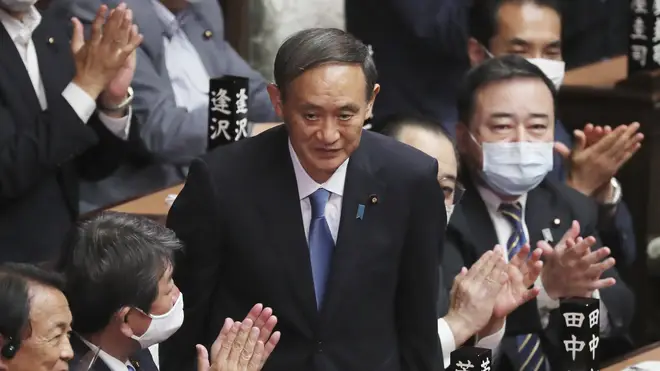
Ian Payne 4am - 7am
16 September 2020, 10:14

Mr Abe, the country’s longest-serving prime minister, announced last month he was stepping down because of health problems.
Japan’s parliament has elected Yoshihide Suga as the country’s new prime minister, following the resignation of Shinzo Abe due to ill health.
Mr Suga bowed deeply several times when the results were announced as his fellow ruling party MPs applauded in Parliament’s lower house, the more powerful of the two chambers where he has a seat. He was also confirmed in the upper house.
Mr Suga, who was chief cabinet secretary and the top government spokesman under Mr Abe, selected a cabinet that is a mix of fresh faces and current or former ministers.
Mr Suga has stressed his background as a farmer’s son and a self-made politician in promising to serve the interests of ordinary people and rural communities. He has said he will pursue Mr Abe’s unfinished policies and that his priorities will be fighting coronavirus and turning around an economy battered by the pandemic.
Mr Abe said before the change was official that as an MP, he will support Mr Suga’s government and he thanked the people for their understanding and their strong support for Mr Suga.
Mr Abe told reporters at the prime minister’s office before heading into his final cabinet meeting: “I devoted my body and soul for the economic recovery and diplomacy to protect Japan’s national interest every single day since we returned to power. During this time, I was able to tackle various challenges together with the people, and I’m proud of myself.”
In a brief farewell ceremony, Mr Abe was presented with a bouquet as all the Prime Minister’s Office staff and Mr Suga lined up and applauded until he disappeared into his car. Mr Abe, 65, said last month he was resigning because his treatment for ulcerative colitis would be ongoing and cause physical weakness.

Mr Suga was a loyal supporter since Mr Abe’s first stint as prime minister from 2006 to 2007 and helped him return to the job in 2012. He gained early support from party heavyweights on expectations he would continue Mr Abe’s line, and his election to lead the ruling party on Monday virtually assured he would be chosen prime minister by Parliament.
Mr Suga, 71, praised Mr Abe’s diplomacy and economic policies when asked what he would like to accomplish himself and says he will set up a new government agency to speed up Japan’s lagging digital transformation.
He said he will break down vested interests and rules that hamper reforms. In reshuffling key posts with the party, however, Mr Suga evenly allocated top posts to key factions, a balancing act seen as returning the favour for their support in the leadership race.